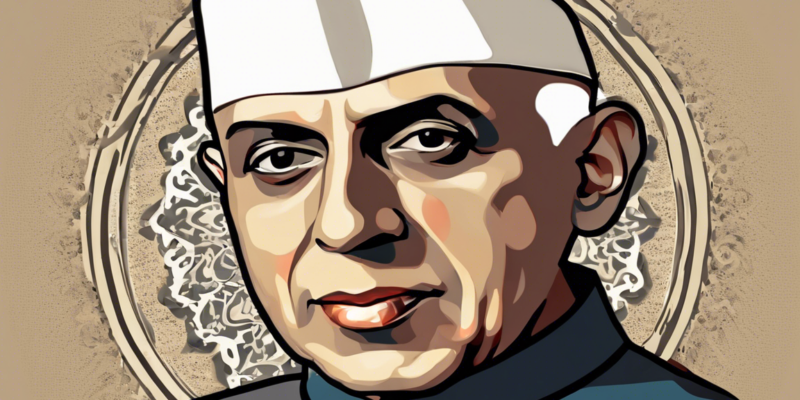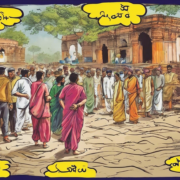Pandit Jawaharlal Nehru, the first Prime Minister of India, was a towering figure in the country’s struggle for independence and its subsequent journey towards nation-building. Fondly referred to as “Chacha Nehru” (Uncle Nehru) by the children of India, he was not only a statesman but also a visionary leader with a deep commitment to democracy, secularism, and social justice. Born on November 14, 1889, Nehru played a pivotal role in shaping modern India and laid the foundation for the country’s development in various spheres.
Early Life and Education
Jawaharlal Nehru was born into a prominent Kashmiri Brahmin family in Allahabad. His father, Motilal Nehru, was a renowned lawyer and a key figure in the Indian National Congress. Nehru received his early education in India and went on to study at Harrow and Trinity College, Cambridge. His exposure to Western philosophy and politics during his time in England greatly influenced his worldview and approach to leadership.
Role in the Freedom Struggle
Nehru’s political awakening happened during his time in England, where he came into contact with prominent Indian nationalist leaders such as Mahatma Gandhi. Upon his return to India, he actively participated in the freedom struggle against British colonial rule. Nehru’s eloquence, commitment to non-violence, and ability to connect with people from all walks of life made him a key figure in the Indian National Congress.
Contribution to India’s Independence
During the freedom struggle, Nehru emerged as one of the foremost leaders advocating for complete independence from British rule. He played a crucial role in the Salt Satyagraha, Quit India Movement, and other civil disobedience campaigns. Nehru’s famous “Tryst with Destiny” speech on the eve of India’s independence in 1947 captured the hopes and aspirations of the nation as it embarked on a new chapter in its history.
Vision for Modern India
As India’s first Prime Minister, Nehru laid down a vision for the country that emphasized democracy, socialism, and secularism. He led the nation in its formative years, steering it towards rapid industrialization, infrastructure development, and the establishment of key institutions such as the Planning Commission and the Indian Institutes of Technology. Nehru’s emphasis on scientific temper and investment in education laid the groundwork for India’s growth as a knowledge economy in the years to come.
Foreign Policy and International Relations
Nehru’s approach to foreign policy was guided by the principles of non-alignment and anti-imperialism. He played a significant role in shaping the Non-Aligned Movement, advocating for the independence of former colonies, and building relationships with countries across the globe. Nehru’s commitment to peace and disarmament earned him respect on the world stage and helped India carve out a unique position in global geopolitics.
Legacy and Impact
Pandit Jawaharlal Nehru’s legacy continues to endure in India’s political, social, and cultural landscape. His emphasis on secularism, inclusivity, and social welfare laid the foundation for India’s democratic ethos. Nehru’s promotion of scientific temper and rational thinking has had a lasting impact on India’s education system and research institutions. His vision of India as a progressive and forward-thinking nation continues to inspire generations of leaders and citizens.
Nehru’s Philosophy and Ideals
Nehru’s political philosophy was rooted in the principles of democracy, socialism, and secularism. He believed in the power of the state to bring about social and economic transformation while upholding the rights and freedoms of its citizens. Nehru’s vision for India was one of a modern, industrialized nation that leveraged technology and innovation for the betterment of its people.
Challenges and Criticisms
While Nehru’s contributions to India’s independence and nation-building are widely acknowledged, his tenure as Prime Minister also faced criticism on various fronts. The border conflict with China in 1962, agrarian challenges, and economic policies have been subjects of debate among historians and political analysts. Nehru’s commitment to non-alignment during the Cold War era also drew both praise and criticism from different quarters.
Conclusion
Pandit Jawaharlal Nehru’s leadership and vision played a pivotal role in shaping the course of modern India. His commitment to democracy, secularism, and social justice laid the foundation for the country’s progress and development. As we remember Nehru’s contributions on his birth anniversary, it is essential to reflect on his ideals and principles, which continue to guide India in its journey towards becoming a vibrant and inclusive democracy.
Frequently Asked Questions (FAQs)
1. What were Jawaharlal Nehru’s major contributions to India’s independence movement?
Jawaharlal Nehru played a key role in the Indian National Congress and led various movements against British colonial rule, including the Salt Satyagraha and the Quit India Movement.
2. How did Nehru contribute to shaping India’s foreign policy?
Nehru advocated for non-alignment, anti-imperialism, and peaceful coexistence, which formed the basis of India’s foreign policy and its role in global geopolitics.
3. What was Nehru’s vision for India’s development and progress?
Nehru envisioned India as a modern, industrialized nation with a focus on science, technology, education, and social welfare to uplift its citizens and propel the country towards growth.
4. What challenges did Nehru face during his tenure as Prime Minister?
Nehru faced challenges such as the border conflict with China, agrarian issues, and economic policies that have been subjects of criticism and debate among scholars and analysts.
5. What is Nehru’s legacy and impact on India’s political landscape?
Nehru’s legacy is seen in India’s democratic ethos, secularism, and emphasis on social welfare, education, and scientific temper, which continue to shape the country’s values and aspirations.




